DC STATEHOOD
WaPo reports that a group of bicyclists gathered in the nation’s capital yesteday to protest the fact that this tiny city with a corrupt government, incredibly high murder rate, and failing infrastructure is not a state:
About 75 bicyclists followed the wildly crooked course yesterday, traveling more than 60 miles and getting a comprehensive tour of each of the city’s quadrants. The ride wasn’t designed merely to give participants a chance to say they biked through all 50 states in one day. It was also intended as a political statement advocating statehood and voting rights for the District.
The bicyclists — symbolically if not actually — were searching in vain for a street named for the District. The ride, which was scheduled for Flag Day and organized by the Washington Area Bicyclists Association, was intended to make the point that there should be one more star on the U.S. flag and one more street in the District named after a state.
“We have all the burdens of being a state, but none of the benefits of being one,” Mayor Anthony A. Williams (D) said at a rally at the start of the ride at Freedom Plaza. “The most important benefit is the right of full representation.”
While one can sympathize with the strange voting status of District residents, the idea of making a tiny city a state, with the same two Senators as California, borders on absurd. In addition to DC’s rather famous lack of ability to govern itself (Exhibit A: Marion Barry), it is ridiculously small, with a population of 572,000 and a land mass smaller than several properties owned by Ted Turner.
If admitted, New Columbia would be the 2nd smallest state population-wise, larger only than Wyoming (494,423). The sub-million population states are historical accidents. The Dakotas (ND=634,448; SD=756,600) should be one state, not, two. Montana (904,433) and Wyoming should probably be one state as well, given the advantage of hindsight. Alaska (634,892) was literally purchased and is not connected to any other states, so there was little choice there. While the famous Great Compromise every schoolboy should have learned in grade school was necessary to get the Constitution ratified, the Framers could never have envisioned that you’d have one state with 494,423 residents and another (California) with 34,501,130, a ratio of 70 to 1. What’s done is done; the Dakotas aren’t going to voluntary give up two senators and a representative between them and nobody else can make them under Article IV, Section 3.
Obviously, DC residents should be allowed representation in Congress. It does not follow, however, that they should have two Senators and a Representative. It has long struck me that the obvious solution would be to return the residential portion of DC to the state of Maryland (Virginia reclaimed its half long ago) and to merely make the federal buildings a federal enclave for purposes of law enforcement jurisdiction, much the way we treat military bases.
Update (9:11, 6-16): Joy notes that I forgot about Vermont (613,090). You’d be surprised how often I do that.
Update (9:24, 6-16): Chris notes that the 25th Amendment also complicates things, which is correct. We’d have to repeal it, which the other states would gladly do and the District residents might be amenable to in order to get congressional representation.

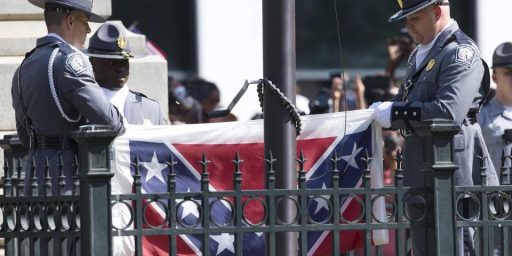
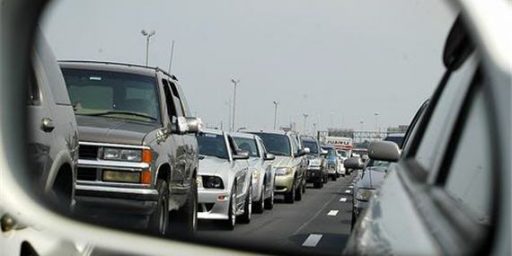
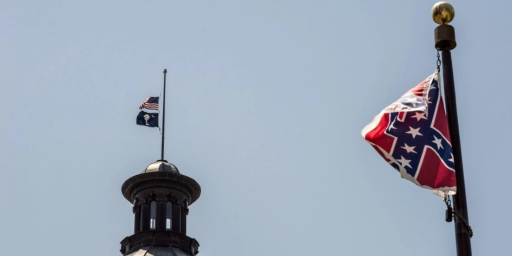
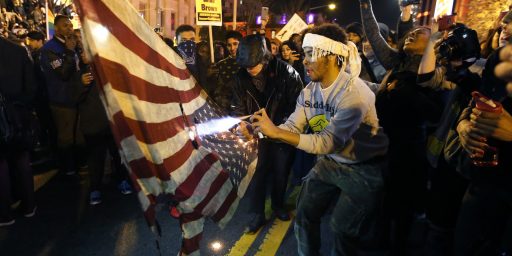
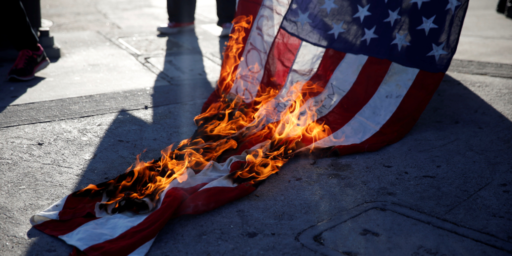
I seriously doubt we will ever see DC become a state. It won’t become a state for the obvious reason that the GOP will not want to add 2 more Democrats to the Senate and an additional Democratic Representative to the Congress, especially in this 50/50 country.
Adding DC to Maryland might actually cuts both ways. Adding DC to Maryland would most likely increase Maryland’s representation in Congress by one and take a seat away from another state (possibly a GOP seat, a plus for Democrats). However, in presidential elections, DC right now gets 3 electoral votes. Adding it Maryland would probably boost Maryland electoral votes by one, but the Democrats would lose the 3 electoral votes it currently gets every election from DC. (a net +2 or +3 electoral votes for the GOP).
Does anyone know what it would take for DC to become part of Maryland? A simple majority in Congress or 2/3 of Congress? Do the other 50 states have to approve it as well?
I think you’re basically right on the politics of DC statehood.
Article IV, Section 3 has the process:
So, a simple majority vote would do it. Congress is composed of representatives from the states, so, yes, indirectly.
/me whistles
you forgot the most politically active sub-million (600K) state with the most noticeable politicians… Vermont.
And the population has only really grown since the 1960s…
Unfortunately, the 25th Amendment makes making D.C. a state more, not less, complicated. Even if the rump District of Columbia was restricted to just the federal buildings and land, there’d still be three electoral votes for the homeless and/or anyone squatting on federal land.
There might be an effective remedy to the squatting problem (redesignating the District as an unoccupied atoll, preferably one that’s highly radioactive) but I’m not sure how you deal with the electoral votes under a retrocession situation (since they’d still count toward the 270-vote threshold, but nobody could win them).
The other problem is: what happens if the federal government cedes its claim to D.C. but Maryland (quite sensibly, I might add) refuses to take it back? Does Virginia get dibs?
Chris,
Yes, you make a good point on the Electoral Votes. Presumably, we’d have to repeal that amendment in exchange for them getting representation in Congress.
I would think Maryland would be glad to have the District, since it would mean another Representative and more federal revenue, but maybe not. I guess Virginia would be the most logical recepient at that point, even though they have no claim to that land.
I don’t think Virginia would want it.